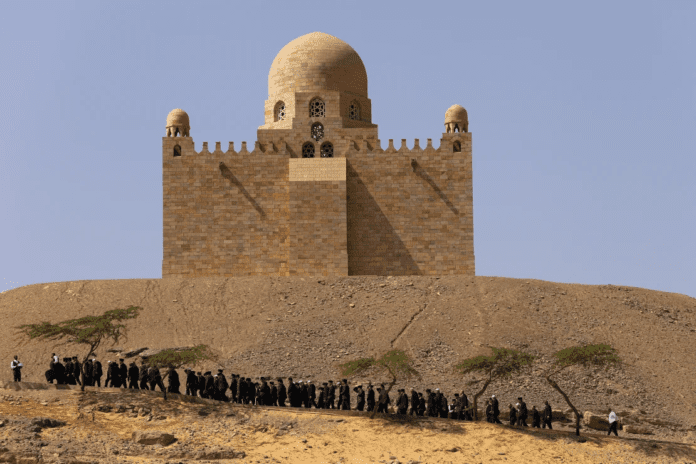Prince Karim Aga Khan IV, the spiritual leader of the Ismaili Muslim community, was laid to rest in Aswan, Egypt, on Sunday, following his passing on February 4 at the age of 88 in Lisbon, Portugal.
His burial site holds deep historical and spiritual significance for the Ismaili community, as Aswan is also the final resting place of his grandfather, Aga Khan III, and his grandmother, Om Habiba. According to Aswan Governor Ismail Kamal, the late Aga Khan had expressed his wish to be buried near his ancestors.
“When his will was opened, it was found that he had requested to be buried in Aswan near his grandfather, Sultan Muhammad Shah, and his grandmother, Om Habiba,” Kamal stated.
The decision to be buried in Aswan reflects the Aga Khan family’s longstanding ties to the region. Aga Khan III, who led the Ismaili Muslim community before his grandson, had developed a deep connection to the area, choosing to build his mausoleum on a hill overlooking the Nile. His presence in Aswan was initially due to health reasons, as he found relief from rheumatism in the area’s therapeutic sands.
His grandson, Aga Khan IV, continued this bond through philanthropic initiatives, including the Om Habibeh Foundation and the Aga Khan Foundation, which have supported local development efforts in Egypt.
Born in Geneva, Switzerland, to Prince Aly Khan and Joan Yarde-Buller, Prince Karim spent part of his early life in Kenya before pursuing his education in Switzerland. His path to leadership took an unexpected turn in 1957 when he was appointed the 49th hereditary Imam of the Ismaili Muslims at just 20 years old. His grandfather, Aga Khan III, bypassed both his father and uncle to name him as his successor.
Under his leadership, the Ismaili community expanded its global influence, with institutions dedicated to education, health, and economic development. Recognized as a head of state by his followers, he was granted the title of “His Highness” by Queen Elizabeth II shortly after assuming his role.
Following his passing, his eldest son, Prince Rahim al-Hussaini Aga Khan, has been named his successor, assuming the title of Aga Khan V. The formal accession ceremony took place at the Diwan of the Ismaili Imamat in Lisbon, Portugal, where leaders of the community gathered for religious recitations and the presentation of insignia of office.
As Aga Khan V steps into his role, the Ismaili community looks ahead to the continuation of a leadership legacy that spans over 1,300 years, tracing its lineage back to the Prophet Muhammad.







